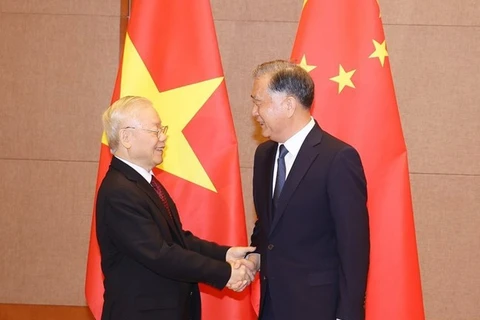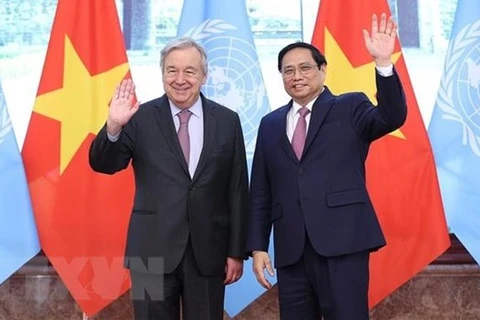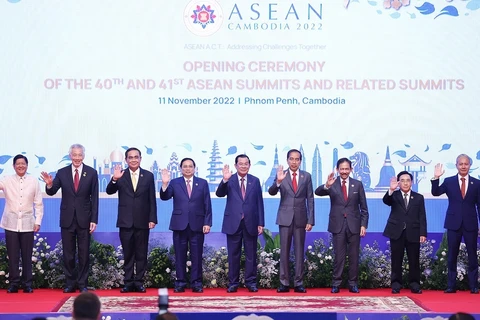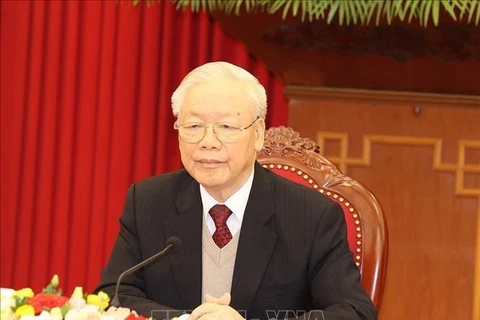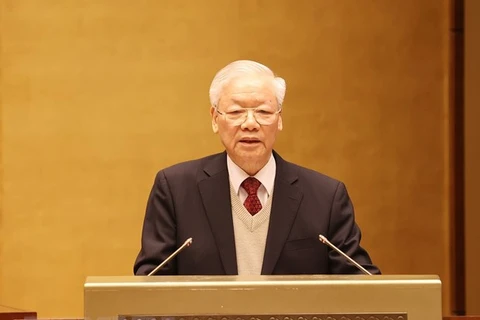Hanoi (VNA) - Bamboo holds a significant place in Vietnamese history, culture, and people’s daily lives, symbolising strength, flexibility, and resilience. Vietnam’s determination to pursue a foreign policy that draws on these characteristics is seen as a pragmatic response to the challenges facing the country in a rapidly-changing world, according to scholars.
Bamboo diplomacy: Vietnam’s unique brand
The term “bamboo diplomacy” was coined by Party General Secretary Nguyen Phu Trong during a diplomatic conference in 2016 and reiterated at the first national conference on foreign affairs in 2021. During these meetings, the leader likened Vietnam’s foreign policy to bamboo, with strong roots, solid stems, and flexible branches.

Phan Xuan Dung, Research Officer at the Vietnam Studies Programme of the Singapore-based ISEAS–Yusof Ishak Institute, pointed out that bamboo grows in groups and is stronger when standing together, reflecting the importance of collective strength and unity in the Vietnamese culture, making it an ideal embodiment of Vietnam’s foreign policy.
Strong roots are core guiding principles such as national interests, independence, self-reliance, diversification, and multilateralization of external relations. These principles are deeply rooted in late President Ho Chi Minh’s thoughts on diplomacy and provide the foundation for the country's foreign policy, Dung said.
The solid stems signify Vietnam's resilience in implementing its foreign policy despite the various challenges it is facing. This reaffirms Vietnam as a friend to all nations, one that is building strong relationships that can withstand strong storms.
The flexible branches represent Vietnam’s ability to be steadfast in principles while being flexible in tactics, he said.
Carl Thayer, Emeritus Professor at the University of New South Wales, said by understanding the concept of bamboo diplomacy, anyone can gain valuable insights into the building blocks of Vietnam’s success.
Bamboo diplomacy is not only about reacting to great power shifts, but also about promoting Vietnamese culture, identity, and economic ties with strategic and comprehensive partners, he said. It is guided by many Vietnamese terms that shape its practice, including multilateralism, diversification, self-reliance, and independence.
Pursuing this diplomacy, Vietnam remains consistent with its “Four No’s” principles enunciated in the 2019 National Defense White Paper, which are neither joining any military alliances, siding with one country against another, giving any other countries permission to set up military bases or use its territory to carry out military activities against other countries, nor using force or threatening to use force in international relations, Thayer said.
Vietnam’s bamboo diplomacy is characterized by independence, positivity, and a commitment to non-interventionism, he said, stressing that Vietnam can be counted on to uphold its values and principles, even in the midst of a complex and ever-changing geopolitical landscape.
“This approach reflects the fact that over the decades, Vietnam has remained a resilient bamboo patch, independent, and self-sufficient.
Scholars have also suggested that to understand the rationale behind Vietnam’s bamboo diplomacy, it is crucial to grasp the country’s long struggle for national independence.
Yoichiro Sato, Professor at the Ritstumeikan Asia Pacific University, said given Vietnam’s history of war and the need for self-reliance, it is understandable why bamboo diplomacy became an important and fundamental aspect of Vietnamese culture and national character. “Vietnam’s bamboo diplomacy is a realistic approach to protect its national interests,” he said.
Sato noted that Vietnam’s history of resilience and ability to withstand external pressure has a role to play in shaping the country’s bamboo diplomacy. Throughout its national history, Vietnam has faced multiple foreign powers and other challenges, yet the country has managed to survive and maintain its independence.
Vietnam has so far established diplomatic ties with 190 out of a total of 193 UN members. Meanwhile, the Party has established relations with 247 political parties in 111 countries, and the National Assembly has relationships with the parliaments of 140 countries, according to the Vietnam’s Ministry of Foreign Affairs.
Moreover, the Vietnamese government has consistently emphasised the importance of independence, even during the COVID-19 pandemic, Sato said. Despite facing a serious shortage of vaccines during the initial stage of the pandemic, Vietnam called for national unity to keep all people together to overcome the challenges, he added.
“I think the emphasis on national independence and unity is not something unique in Vietnam, but my impression is that it is particularly strongly emphasized in Vietnam’s case. And that’s very important,” he said.
Bamboo diplomacy: From words to action
According to Dung, bamboo diplomacy is a suitable concept for promoting Vietnam’s diplomatic identity in the current context. First, it is appropriate because the image of bamboo is deeply ingrained in Vietnamese culture, values, and diplomatic traditions. Second, the recent promotion of bamboo diplomacy reflects Vietnam’s confidence in its diplomatic achievements and implementation of foreign policies, Dung explained.
In particular, he said, Vietnam’s international integration since Doi Moi (Reform) has proved highly successful. As General Secretary Nguyen Phu Trong stated, Vietnam “has never had such a great fortune, potential, international stature and prestige as it is having now.” In recent years, Vietnam has emerged as a growing middle power and made significant contributions to regional and international multilateralism, earning recognition from the international community, according to Dung.
Bamboo diplomacy also allows Vietnam to forge a diverse network of partnerships, especially with major powers, Dung said. Through these relations, Vietnam has been able to expand trade and investment ties, enhance its national defense capabilities, gain international prestige, and ensure a peaceful and stable external environment for national development.
Most importantly, bamboo diplomacy enables Vietnam to maintain its independence and autonomy amidst growing major power competition in the region, Dung stressed.
Sharing the same view, Stephen Nagy, Professor at International Christian University, said through the application of bamboo diplomacy in a flexible, resilient, and responsive manner, Vietnam has successfully maintained pragmatic relationships with major countries and other Southeast Asian nations to promote its own development and security agenda.
“Vietnam has undertaken some economic reforms over the past 40 years to attract overseas development aids, as well as foreign direct investment to position itself as a new manufacturing hub in Southeast Asia. The move contributes to increasing prosperity and accelerating the development of Vietnam,” Nagy said.
Like Dung, Nagy also sees Vietnam as a middle power. He quoted the Asia Power Index 2023 from the Lowy Institute as saying that by the latest rankings, Vietnam was the second-most diplomatically influential country in Southeast Asia.
“If we use data sets like the Lowy Institute’s Asia Power Index, it’s clear that Vietnam is a middle power in terms of its overall resources, population, economic size, and diplomatic power,” Nagy said.
He added that Vietnamese bamboo diplomacy is pragmatic, realistic, and regionally focused. “It’s pragmatic in terms of forming relationships with all different kinds of countries, primarily focusing on Southeast Asia, and working with extra regional partners to improve its security, stability, and prosperity.”
Besides the economic dimension, Thayer provided a concrete example that demonstrates the success of Vietnam’s bamboo diplomacy in promoting cultural values - the country’s ability to attract a growing number of tourists and build strong bonds with people from different countries, based on the appeal of Vietnamese culture, politeness, and cuisine.
He said this soft power approach is a key component of Vietnam’s bamboo diplomacy, which emphasises the need to build positive relationships with other countries and foster mutual understanding and respect.
Agreeing with Thayer, Dung said by promoting the diplomatic identity of resilience, solidarity, and flexibility embodied by bamboo, Vietnam showcases its unique cultural identity and fosters a positive image of the country abroad.
After a two-year hiatus due to COVID-19, Vietnam reopened its doors to international tourists on March 15, 2022, and has since seen a surge in foreign holidaymakers visiting the country. According to the latest data from the General Statistics Office, Vietnam welcomed 2.69 million foreign arrivals in the first quarter of this year, representing a nearly 30-fold increase compared to the same period last year.
Thayer also highlighted the significant expansion of Vietnam’s diplomatic relations in recent years, with the country now having relations with nearly all members of the UN, forging strategic and comprehensive partnerships, and securing free trade agreements with major regional partners. Particularly, Vietnam has been a very constructive contributor to ASEAN and multilateralism, he said.
Bamboo diplomacy: Path ahead
Scholars pointed out that Vietnam is facing a growing number of challenges as it navigates the rapidly changing global situation. These challenges are exacerbated by various factors, including global geopolitical tensions and economic slowdown.
The COVID-19 pandemic has presented significant challenges to foreign policy, including Vietnam’s bamboo diplomacy, according to Nagy. Large-scale lockdowns and travel restrictions have disrupted global supply chains, and all countries have been affected, he said.
Moving forward, he went on, it is likely that these challenges will persist, and there may be further unexpected events, such as natural disasters, transnational disease outbreaks, or economic recessions that make it more difficult for Vietnam and other countries to balance their relationships. “These challenges will require creative solutions and a continued focus on flexibility and resilience in foreign policy,” he suggested.
To counter these headwinds, Thayer said, Vietnam must tackle these challenges with great care and skill if it wishes to maintain its independence, promote its interests, and uphold its values.
Vietnam could use its relationships with multiple partners to its advantage. Even if these partners have disagreements with each other, Vietnam can still navigate these situations to benefit its own interests, Thayer said. “This is possible because Vietnam can leverage its position as a trusted partner and mediator to help resolve disputes or find mutually beneficial solutions.”
Last year, Party General Secretary Nguyen Phu Trong paid an official visit to China from October 30 to November 1, at the invitation of Party General Secretary and President of China Xi Jinping. Most recently in March 2023, he held phone talks with US President Joe Biden, during which the two sides reiterated their invitations for mutual high-level visits.
“This is important for Vietnam’s economic development, as it needs good relations with all major powers to achieve its goals of raising income levels and developing the economy,” Thayer said.
According to Sato, amid growing international tensions, Vietnam is expected to continue its bamboo diplomacy due to its success in maintaining balanced relationships with all nations. However, as its strength and influence increase, greater effort is required to build on its accomplishments.
Meanwhile, Dung pointed out that, despite the growing external challenges, Vietnam has been able to maintain its independence and autonomy while recording high economic growth and building closer ties with all major powers in the region.
“Vietnam’s reputation has continued to rise on both regional and international platforms. Consequently, Vietnam has compelling reasons to continue its bamboo diplomacy to advance its foreign policy goals,” Dung said.
However, he noted that Vietnam must ensure that it remains sufficiently flexible and adaptable to the rapidly evolving geopolitical landscape and non-traditional security challenges.
According to Nagy, having the flexibility and also the resilience of bamboo or being able to swing or tilt in different directions is really critical for Vietnam in maintaining its strategic autonomy, good partnerships, and sound relations with its neighbours. “By balancing its relationships and adapting to different circumstances, Vietnam can continue to secure its national interests while maintaining a good rapport with countries across the globe,” he said.
Moving forward, it is important for Vietnam to maintain its bamboo diplomacy, which entails being resilient, flexible, and cooperative with all partners, Nagy said. “This means continuing to build dialogue with various partners, investing in young people so they can effectively communicate and engage with the regional community, and working with regional and international partners to sustain economic growth,” he explained./.
